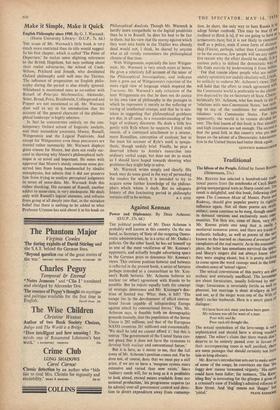Make it Simple, . Make it Quick English Philosophy since 1900.
By G. J. Warnock.
(Home University Library : O.U.P., 7s. 6d.) THE scope of Mr. Warnock's little book is very much more restricted than its title would suggest. In his first chapter, which is called 'The Point of Departure,' he makes some slighting references to the British Hegelians, but says nothing about their realist adversaries, the school of Cook- Wilson, Prichard and Joseph, who dominated Oxford philosophy until well into the Thirties. The influence of pragmatism on English philo- sophy during the -period is also wholly ignored. Whitehead is mentioned once as co-author with Russell of Principia Mathentatica; Alexander, Stout, Broad, Price, Braithwaite, Collingwood and Popper are not mentioned at all. Mr. Warnock does well to say in his introduction that his account of 'the general character of the philoso- phical landscape' is highly selective.
In fact he concentrates entirely on the con- temporary Oxford school of linguistic analysts, and their immediate ancestors, Moore, Russell, Wittgenstein and the Logical Positivists. And except for Wittgenstein even these precursors are treated rather summarily. Mr. Warnock displays great esteem for Moore, but does not really suc- ceed in showing why Moore's philosophical tech- nique is so novel and important. He notes with approval that Moore's sturdy common sense pre- served him from being bamboozled by idealist metaphysics, but admits that it did not preserve him from trying to analyse perceptual judgments in terms of sense-data. Mr. Warnock finds this rather shocking. His account of Russell, another addict to sense-data, is very inadequate. He deals only with Russell's logical atomism, and refrains from going at all deeply into that, in the mistaken belief that there is nothing to be added to what Professor Urmson has said about it in his book on
Philosophical Analysis. Though Mr. Warnock is hardly more sympathetic to the logical positivists than he is to Russell, he does his best to be fair to them; but his view that the enemy against which they went into battle in the Thirties was already dead would not, I think, be shared by anyone who at all vividly remembers the philosophical climate of that time.
With Wittgenstein, especially the later Wittgen- stein, Mr. Warnock is very much more at home. He gives a relatively full account of the tenor of the Philosophical Investigations, and indicates how it grew out of Wittgenstein's rejection of the more rigid view of language which inspired the Tractatus. Mr. Warnock's only criticisms of the later Wittgenstein are that he does not do justice to his own view of philosophy in the passages in which he represents it merely as the suffering or curing of intellectual cramps, and that he is mis- taken in suggesting that philosophical problems are due, in all cases, to a misunderstanding of the logic of ordinary discourse. He deals a little less gently with Ryle whom he suspects, I think with reason, of a continued attachment to a stricter, more Russellian, conception of analysis; but in the main his account of Ryle's work is sympa- thetic, though unduly brief. Finally, he pays a deserved tribute to Austin's researches into ordinary verbal usage, but does not do as much as I should have hoped towards showing what problems they might help to solve.
Mr. Warnock writes simply and clearly. His book may do some good in the way of persuading the readers for which it is intended to try to acquire some further knowledge of the philoso- phers which whom it deals. 'But an adequate history of this fascinating period in philosophy
remains still to be written. A. 3. AYER


































 Previous page
Previous page